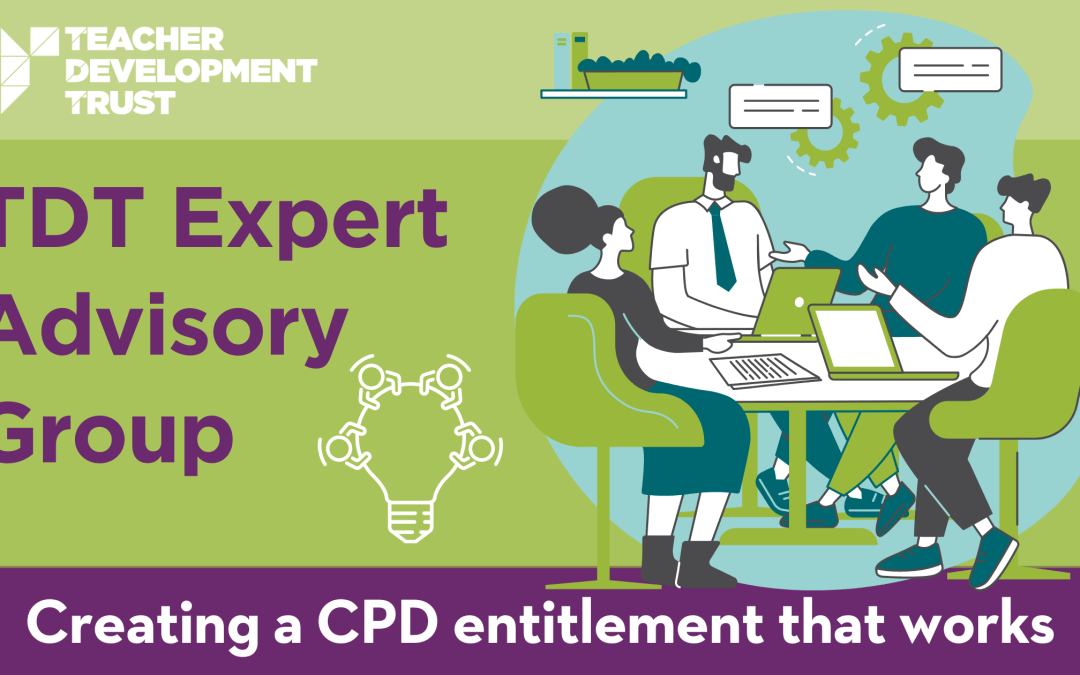Today Teacher Tapp has published data that sheds new light on the perceptions of teachers in relation to their own professional development. We welcome this as an important and additional contribution to the wider understanding of how those invested in professional development for teachers can best frame their work.
In particular, we have been pleased to work with the Gatsby Foundation and Teacher Tapp on this survey as a way of contributing to the report on introducing an entitlement to CPD for all teachers and school leaders that we will release in the coming weeks.
A key finding of the Teacher Tapp work highlights there is an appetite for change within the profession, but moreover an understanding of the positive impact good CPD could have on the sector. More than one–in-ten teachers and two to three-out-of-ten Heads would choose CPD vouchers over a pay rise.
After the Labour Party announced its intention to launch a CPD entitlement (in its mission document on Breaking Down the Barriers to Opportunity.) TDT established a group of experts to consider how such a policy might best be introduced. We have been leading data collection and consultation with individuals and groups across the sector in facilitated focus groups, interviews, roundtable discussions and received data returns from two surveys. Our findings and preliminary conclusions have been considered by our expert group and will be published in a final report before Spring 2024. The foundation of our research and data collection starts from the basis that teachers accessing and engaging in continuous professional development is uniquely impactful.
It enables individuals to expand upon their own learning, which in turn benefits the learning experience of children and young people. This is backed up by the Teacher Tapp release today that shows approximately ‘three-quarters acknowledge that professional development activities, both formal and informal, have helped them become at least slightly better teachers, and around half report that professional development sessions have had a ‘strong’ to ‘very strong’ influence on their practice over the last five years. An acknowledgement from within the profession that CPD, in a number of forms, can have an influence on the approaches and techniques used by teachers is important. However, as found in our research and in this report, the type of professional development available and the pathways or opportunities to accessing it can be improved.
The so-called ‘Golden-Thread’ has dominated recent investment and initiatives around CPD – this is the focus on creating coherence between ITT, the new Early Career Framework, and reformed NPQs (and here at TDT we are proud of our involvement in the latter). But, given that ‘only one-in-five teachers prioritised working towards a qualification, we can assume that this avenue of obtaining training and knowledge does not meet the needs of all teachers in all settings. Indeed, the data shows that schools invest in CPD from a range of other sources, not least when planning INSET days, although this spend is under pressure as schools deal with ever more constrained finances. This reinforces the idea that a focus on the ‘Golden-Thread’ may be necessary, but it is not going to be sufficient to meet the professional development needs of an entire sector.
The TeacherTapp survey provides further evidence, finding that ‘Only 1-in-10 teachers favour an external approval system for funded-CPD. In other words, just because the Government says something is good, it doesn’t mean that the profession buys into it. Throughout our data collection, we found that when consulting with teachers across the sector they felt that centrally funded and approved CPD didn’t always feel applicable and related to their local context.
The Teacher Tapp data on INSET days is revealing, and will help us consider how any entitlement to CPD should interact with the statutory INSET day requirements and how they are used. These are days often at the start of each school year for teachers to prepare for the teaching year ahead. Despite being described as CPD, Teacher Tapp has found that INSET days ‘focus on school policies, compliance and planning. In fact, fewer than two-thirds of teachers said that INSET days at the start of the school year involved professional development in any form. As found in our engagement with colleagues across the sector it feels there is an important distinction to be made between organisational and institutional training and personal professional development specifically for individuals. There is a world in which both of these things can exist, but it must be made clear that they serve different purposes. A key finding of the Teacher Tapp work highlights there is an appetite for change within the profession, but moreover an understanding of the positive impact good CPD could have on the sector, ‘more than one–in-ten teachers and two to three-out-of-ten Heads would choose CPD vouchers over a pay rise. Teachers are therefore clearly receptive to policies that increase their access to CPD. Given the headlines around teachers’ pay, it is safe to say that placing access to CPD as a comparable priority emphasises the need to develop a responsive policy that accurately reflects the sector.
About the author: Faye Lawlor is Education Programme Manager and Project lead of the CPD Entitlement research at TDT. Before joining TDT, Faye worked at Arts Council England as an Investment Partner designing and facilitating investment programmes, co-funded by the Department for Education, which focused on the engagement of children and young people in arts and culture. She is motivated by supporting the professional development of teachers and schools, to improve the learning experience of children and young people


